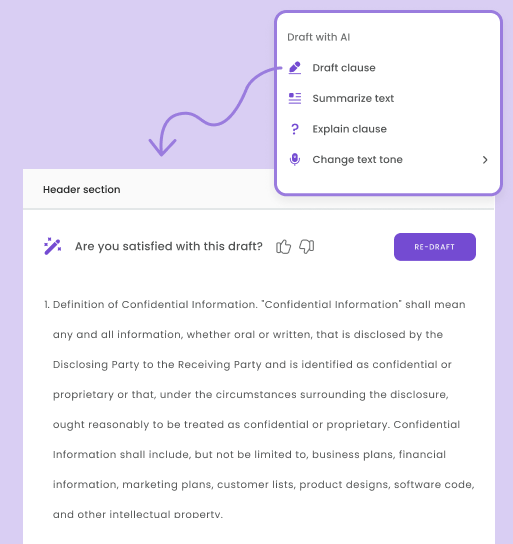Commerce is built on various types of commercial contracts. Some of them are for massive sums and projects while others are relatively small. All of them have similarities that mark them as commercial contracts.
In this guide, you’ll get a deeper understanding of what a commercial contract is, key clauses, and the different types of commercial contracts you may consider using.
Basics of a Commercial Contract
Commercial contracts are fundamental to business transactions and play a crucial role in the world of commerce.
A commercial contract is a legally binding agreement between two or more parties in a business context. These contracts outline the terms and conditions governing a wide range of commercial activities, such as the sale of goods or services, business partnerships, leases, loans, and more. Commercial contracts are used to establish the rights, obligations, and expectations of the parties involved in the transaction.
Types of Commercial Contract
Commercial contracts come in various forms, each tailored to specific business needs and transactions. While almost every contract is unique, they can often be categorized into large groups. Here are examples and key details for some common types of commercial contracts:
Sale of Goods Contracts:
- Definition and Key Provisions:
Sale of goods contracts, often referred to as purchase agreements or sales agreements, outline the terms and conditions governing the sale and purchase of tangible products.
Key provisions include the identification of the parties, a description of the goods, price, delivery terms, payment terms, warranties, and dispute resolution mechanisms.
- Example: Purchase Agreement for Electronics:
- Parties: Seller Electronics Inc. and Buyer Tech Gadgets LLC
- Description of Goods: 100 units of Model X smartphones
- Price: $10,000
- Delivery Terms: FOB (Free On Board) at Seller’s warehouse
- Payment Terms: 30 days net
- Warranties: Seller warrants that the goods are free from defects for 1 year from the date of delivery.
Service Contracts:
- Scope and Terms:
Service contracts detail the scope of services to be provided by one party (the service provider) to another party (the client or customer). Terms may include the scope of work, service duration, payment terms, milestones, termination conditions, and confidentiality clauses.
- Example: Consulting Services Contract:
- Parties: XYZ Consulting Services and ABC Corporation
- Scope of Work: Strategic business consulting services, including market research, financial analysis, and recommendations.
- Service Duration: 6 months, commencing on [start date].
- Payment Terms: Monthly payments of $5,000 within 15 days of invoice receipt.
- Confidentiality: Both parties agree to maintain the confidentiality of all information shared during the engagement.
Lease Agreements:
- Leasing Real Property and Equipment:
Lease agreements can pertain to real property (e.g., commercial buildings or office space) or equipment (e.g., machinery, vehicles). They define the terms of the lease, including rent, duration, responsibilities for maintenance, and dispute resolution procedures.
- Example: Commercial Property Lease:
- Parties: Landlord ABC Properties and Tenant XYZ Corporation
- Property Description: 5,000 square feet of office space located at [address].
- Lease Term: 3 years, starting on [start date].
- Rent: $3,000 per month, payable on the 1st of each month.
- Maintenance: The Landlord is responsible for structural repairs; the Tenant is responsible for routine maintenance.
Partnership Agreements:
- Formation and Governance:
Partnership agreements are used to create and manage partnerships between two or more individuals or entities. They specify the roles and responsibilities of each partner, profit-sharing arrangements, decision-making processes, and dispute resolution mechanisms.
- Example: Business Partnership Agreement:
- Parties: Partners A, B, and C in ABC Ventures, a general partnership.
- Roles and Responsibilities: Partner A is responsible for operations, Partner B for finance, and Partner C for marketing.
- Profit-sharing: Profits and losses will be shared equally among partners.
- Decision-Making: Major decisions require a unanimous vote; day-to-day decisions are the responsibility of Partner A.
- Dispute Resolution: Disputes will be resolved through mediation, with arbitration as a final resort.
These examples provide a glimpse into the variety and importance of a commercial contract in the business world. Each type of contract serves specific purposes and helps ensure that business transactions are conducted smoothly, with clear terms and legal protections for all parties involved.
Key Clauses in a Commercial Contract
Key clauses in commercial contracts are essential for defining the terms and conditions of the agreement, as well as for ensuring the rights and responsibilities of the parties involved. Here are some key clauses commonly found in commercial contracts:
Price and Payment Terms:
- Price: Specifies the agreed-upon price for goods or services.
- Payment Terms: Outlines when and how payments are to be made, including due dates, methods of payment, and any late fees or interest charges.
Delivery and Performance Obligations:
- Delivery Terms: Describes how and when goods or services will be delivered, including shipping terms and responsibilities.
- Performance Obligations: Details the specific requirements, standards, or milestones that must be met by the parties involved.
Duration and Termination:
- Duration: Specifies the duration or term of the contract, whether it’s a fixed term or ongoing.
- Termination: Outlines the conditions under which the contract can be terminated, including reasons for termination, notice periods, and any penalties or consequences.
Confidentiality and Non-Compete Clauses:
- Confidentiality: Requires parties to keep certain information confidential and outlines the consequences of breaching confidentiality.
- Non-Compete: Prohibits one or both parties from engaging in competitive activities during or after the contract term within a defined geographic area or industry.
Dispute Resolution Mechanisms:
- Mediation: Specifies that parties will attempt to resolve disputes through a neutral third-party mediator before pursuing litigation.
- Arbitration: Requires parties to submit disputes to binding arbitration, where an arbitrator makes a final decision instead of going to court.
- Choice of Law: Indicates which jurisdiction’s laws will govern the contract and any disputes that arise.
Force Majeure Clauses:
- Force Majeure: Defines unforeseeable events beyond the parties’ control, such as natural disasters, wars, or government actions, and outlines the consequences and options in case of such events, including potential contract suspension or termination.
These key clauses are critical in commercial contracts because they help ensure clarity, accountability, and fairness in business transactions. Depending on the specific type of contract and the parties involved, there may be additional clauses and provisions tailored to address unique circumstances and requirements. Thoroughly review and understand all clauses in a contract before signing to avoid misunderstandings and potential disputes in the future. Additionally, legal advice may be sought to draft or review complex commercial contracts to ensure they align with applicable laws and best practices.
Importance of Commercial Contracts in Business
Commercial contracts play a vital role in business for several reasons, and their importance cannot be overstated. Here are key aspects highlighting their significance:
Risk Mitigation and Protection:
- Legal Protection: Commercial contracts provide a legal framework that defines the rights and obligations of the parties involved. This framework helps protect parties from potential disputes, breaches, and liabilities.
- Risk Management: By clearly outlining expectations, responsibilities, and consequences, contracts help manage and mitigate various risks associated with business transactions. For instance, they specify what happens in case of non-performance, product defects, or payment delays.
- Contingency Planning: Contracts often include contingency clauses, such as force majeure provisions, which address unforeseen events (e.g., natural disasters) and their impact on the contract, allowing parties to plan for unexpected disruptions.
Creating Legal Boundaries:
- Clarity and Precision: Contracts establish clear and precise terms and conditions, leaving no room for misunderstandings or misinterpretations. This ensures that both parties are on the same page regarding their obligations and expectations.
- Enforceability: When properly drafted and executed, a commercial contract is legally binding. This means that parties can enforce their rights and seek remedies through the legal system if the contract is breached.
- Framework for Agreements: Contracts are essential for documenting agreements and commitments, transforming verbal discussions or negotiations into legally enforceable obligations. They provide a formal record of the parties’ intentions.
Building Trust and Accountability:
- Trustworthiness: Commercial contracts contribute to building trust between parties. When all terms and conditions are in writing, parties are more likely to have confidence in the reliability and integrity of their business partners.
- Accountability: Contracts hold parties accountable for their actions and ensure they meet their obligations. This accountability fosters a sense of responsibility and encourages compliance with agreed-upon terms.
- Long-Term Relationships: In many cases, business relationships endure beyond a single transaction. Well-structured contracts can help maintain positive, long-term relationships by providing a foundation of trust and predictability.
In summary, commercial contracts are indispensable in business because they serve as risk management tools, create legally enforceable boundaries, and foster trust and accountability among parties. Whether in simple transactions or complex business deals, contracts provide a structured and reliable framework for conducting business, reducing uncertainty, and protecting the interests of all parties involved.
Challenges and Pitfalls
Commercial contracts are essential tools for businesses, but they also come with challenges and potential pitfalls. Understanding and addressing these challenges is crucial to effective contract management. Here are some common challenges and pitfalls in commercial contracts:
Ambiguity and Vagueness:
- Challenge: Contracts that are unclear or contain ambiguous language can lead to misunderstandings and disputes. Ambiguity can arise from poorly defined terms, vague descriptions of obligations, or conflicting clauses.
- Pitfall: Parties may have different interpretations of the contract’s terms, leading to disagreements and delays in performance. Ambiguity can also result in costly legal disputes.
- Mitigation: Contracts should be drafted with precision and clarity. Legal experts or contract professionals can help identify and rectify ambiguous language. Parties should also engage in thorough negotiations to ensure mutual understanding.
Failure to Keep Contracts Updated:
- Challenge: Business environments are dynamic, and circumstances may change over time. Failure to update contracts when necessary can result in outdated or irrelevant terms.
- Pitfall: Outdated contracts may no longer reflect your current needs, objectives, or legal requirements. This can lead to non-compliance, disputes, and missed opportunities.
- Mitigation: Regularly review and update contracts to ensure they remain relevant and compliant with changing laws and business needs. Consider including provisions that allow for amendments or renegotiations under specific conditions.
Breach of Contract and Legal Consequences:
- Challenge: Contract breaches occur when one party fails to fulfill its obligations as outlined in the agreement. This can be due to various reasons, including financial difficulties, disputes, or unforeseen events.
- Pitfall: Breach of contract can lead to legal action, damages, and loss of trust between parties. Legal consequences may include monetary penalties, injunctions, or even termination of the contract.
- Mitigation: To mitigate the risk of breach, contracts should include clear performance obligations, remedies for breaches, and dispute resolution mechanisms. Parties should also communicate openly and seek resolution before resorting to legal action whenever possible.
It’s important for businesses to be proactive in addressing these challenges and pitfalls. Contract management practices, including careful drafting, regular updates, and proactive dispute resolution, can help businesses navigate the complexities of commercial contracts and minimize the associated risks. Additionally, seeking legal advice when drafting or reviewing contracts can provide valuable insights and help ensure compliance with applicable laws and regulations.
Conclusion
Commercial contracts are important when it comes to different types of commerce. They keep us honest and protect our interests. The good news is that they come in many shapes and sizes and can be tailored to fit your needs.
Of course, you’ll need to include the elements of a valid contract, ensure you practice risk mitigation strategies, and are aware of the challenges that can come about. They’re worth it but you need to educate yourself before using them.
Let me know what you think in the comments and be sure to check out DoxFlowy for your electronic signing and contract management needs.




